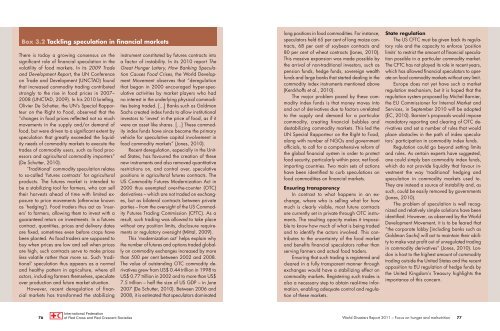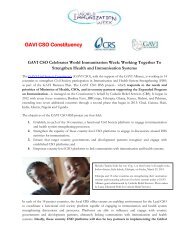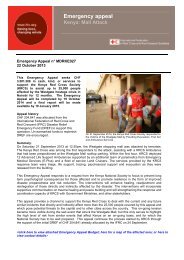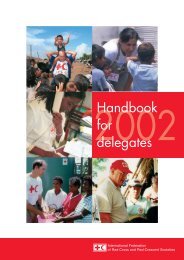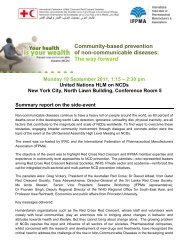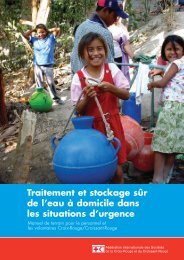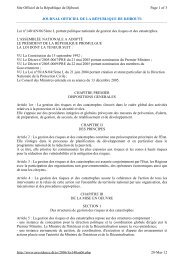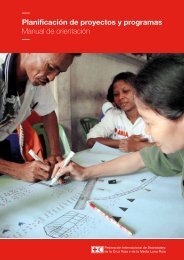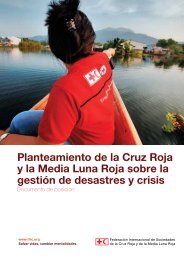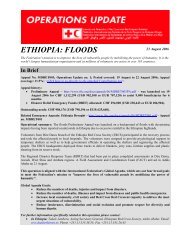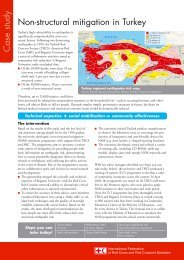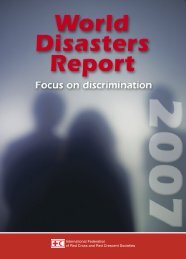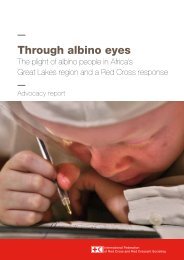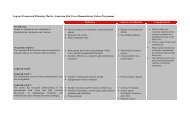World Disasters Report - International Federation of Red Cross and ...
World Disasters Report - International Federation of Red Cross and ...
World Disasters Report - International Federation of Red Cross and ...
Create successful ePaper yourself
Turn your PDF publications into a flip-book with our unique Google optimized e-Paper software.
Box 3.2 Tackling speculation in financial markets<br />
There is today a growing consensus on the<br />
significant role <strong>of</strong> financial speculation in the<br />
volatility <strong>of</strong> food markets. In its 2009 Trade<br />
<strong>and</strong> Development <strong>Report</strong>, the UN Conference<br />
on Trade <strong>and</strong> Development (UNCTAD) found<br />
that increased commodity trading contributed<br />
strongly to the rise in food prices in 2007–<br />
2008 (UNCTAD, 2009). In his 2010 briefing,<br />
Olivier De Schutter, the UN’s Special Rapporteur<br />
on the Right to Food, observed that the<br />
“changes in food prices reflected not so much<br />
movements in the supply <strong>and</strong>/or dem<strong>and</strong> <strong>of</strong><br />
food, but were driven to a significant extent by<br />
speculation that greatly exceeded the liquidity<br />
needs <strong>of</strong> commodity markets to execute the<br />
trades <strong>of</strong> commodity users, such as food processors<br />
<strong>and</strong> agricultural commodity importers”<br />
(De Schutter, 2010).<br />
‘Traditional’ commodity speculation relates<br />
to so-called ‘futures contracts’ for agricultural<br />
products. The futures market is intended to<br />
be a stabilizing tool for farmers, who can sell<br />
their harvests ahead <strong>of</strong> time with limited exposure<br />
to price movements (otherwise known<br />
as ‘hedging’). Food traders thus act as ‘insurers’<br />
to farmers, allowing them to invest with a<br />
guaranteed return on investments. In a futures<br />
contract, quantities, prices <strong>and</strong> delivery dates<br />
are fixed, sometimes even before crops have<br />
been planted. As food traders are supposed to<br />
buy when prices are low <strong>and</strong> sell when prices<br />
are high, such contracts serve to make prices<br />
less volatile rather than more so. Such ‘traditional’<br />
speculation thus appears as a normal<br />
<strong>and</strong> healthy pattern in agriculture, where all<br />
actors, including farmers themselves, speculate<br />
over production <strong>and</strong> future market situation.<br />
However, recent deregulation <strong>of</strong> financial<br />
markets has transformed the stabilizing<br />
76<br />
instrument constituted by futures contracts into<br />
a factor <strong>of</strong> instability. In its 2010 report The<br />
Great Hunger Lottery, How Banking Speculation<br />
Causes Food Crises, the <strong>World</strong> Development<br />
Movement observes that “deregulation<br />
that began in 2000 encouraged hyper-speculative<br />
activities by market players who had<br />
no interest in the underlying physical commodities<br />
being traded. [...] Banks such as Goldman<br />
Sachs created index funds to allow institutional<br />
investors to ‘invest’ in the price <strong>of</strong> food, as if it<br />
were an asset like shares. [...] These commodity<br />
index funds have since become the primary<br />
vehicle for speculative capital involvement in<br />
food commodity markets” (Jones, 2010).<br />
Recent deregulation, especially in the United<br />
States, has favoured the creation <strong>of</strong> these<br />
new instruments <strong>and</strong> also removed quantitative<br />
restrictions on, <strong>and</strong> control over, speculative<br />
positions in agricultural futures contracts. The<br />
US Commodity Futures Modernization Act in<br />
2000 thus exempted over-the-counter (OTC)<br />
derivatives – which are not traded on exchanges,<br />
but as bilateral contracts between private<br />
parties – from the oversight <strong>of</strong> the US Commodity<br />
Futures Trading Commission (CFTC). As a<br />
result, such trading was allowed to take place<br />
without any position limits, disclosure requirements<br />
or regulatory oversight (Mittal, 2009).<br />
This ‘modernization act’ helps explain why<br />
the number <strong>of</strong> futures <strong>and</strong> options traded globally<br />
on commodity exchanges increased by more<br />
than 500 per cent between 2002 <strong>and</strong> 2008.<br />
The value <strong>of</strong> outst<strong>and</strong>ing OTC commodity derivatives<br />
grew from US$ 0.44 trillion in 1998 to<br />
US$ 0.77 trillion in 2002 <strong>and</strong> to more than US$<br />
7.5 trillion – half the size <strong>of</strong> US GDP – in June<br />
2007 (De Schutter, 2010). Between 2006 <strong>and</strong><br />
2008, it is estimated that speculators dominated<br />
long positions in food commodities. For instance,<br />
speculators held 65 per cent <strong>of</strong> long maize contracts,<br />
68 per cent <strong>of</strong> soybean contracts <strong>and</strong><br />
80 per cent <strong>of</strong> wheat contracts (Jones, 2010).<br />
This massive expansion was made possible by<br />
the arrival <strong>of</strong> non-traditional investors, such as<br />
pension funds, hedge funds, sovereign wealth<br />
funds <strong>and</strong> large banks that started dealing in the<br />
commodity index instruments mentioned above<br />
(Kerckh<strong>of</strong>fs et al., 2010).<br />
The major problem posed by these commodity<br />
index funds is that money moves into<br />
<strong>and</strong> out <strong>of</strong> derivatives due to factors unrelated<br />
to the supply <strong>and</strong> dem<strong>and</strong> for a particular<br />
commodity, creating financial bubbles <strong>and</strong><br />
destabilizing commodity markets. This led the<br />
UN Special Rapporteur on the Right to Food,<br />
along with number <strong>of</strong> NGOs <strong>and</strong> government<br />
<strong>of</strong>ficials, to call for a comprehensive reform <strong>of</strong><br />
the global financial system in order to protect<br />
food security, particularly within poor, net foodimporting<br />
countries. Two main sets <strong>of</strong> actions<br />
have been identified to curb speculations on<br />
food commodities on financial markets.<br />
Ensuring transparency<br />
In contrast to what happens in an exchange,<br />
where who is selling what for how<br />
much is clearly visible, most future contracts<br />
are currently set in private through OTC instruments.<br />
The resulting opacity makes it impossible<br />
to know how much <strong>of</strong> what is being traded<br />
<strong>and</strong> to identify the actors involved. This contributes<br />
to the uncertainty <strong>of</strong> the food market<br />
<strong>and</strong> benefits financial speculators rather than<br />
serving farmers <strong>and</strong> actual food traders.<br />
Ensuring that such trading is registered <strong>and</strong><br />
cleared in a fully transparent manner through<br />
exchanges would have a stabilizing effect on<br />
commodity markets. Registering such trades is<br />
also a necessary step to obtain real-time information,<br />
enabling adequate control <strong>and</strong> regulation<br />
<strong>of</strong> these markets.<br />
State regulation<br />
The US CFTC must be given back its regulatory<br />
role <strong>and</strong> the capacity to enforce ‘position<br />
limits’ to restrict the amount <strong>of</strong> financial speculation<br />
possible in a particular commodity market.<br />
The CFTC has not played its role in recent years,<br />
which has allowed financial speculators to operate<br />
on food commodity markets without any limit.<br />
Europe does not yet have such a market<br />
regulation mechanism, but it is hoped that the<br />
regulation system proposed by Michel Barnier,<br />
the EU Commissioner for Internal Market <strong>and</strong><br />
Services, in September 2010 will be adopted<br />
(EC, 2010). Barnier’s proposals would impose<br />
m<strong>and</strong>atory reporting <strong>and</strong> clearing <strong>of</strong> OTC derivatives<br />
<strong>and</strong> set a number <strong>of</strong> rules that would<br />
place obstacles in the path <strong>of</strong> index speculators’<br />
participation in commodity index funds.<br />
Regulation could go beyond setting limits<br />
<strong>and</strong> rules. As certain experts have suggested,<br />
one could simply ban commodity index funds,<br />
which do not provide liquidity that favour investment<br />
the way ‘traditional’ hedging <strong>and</strong><br />
speculation in commodity markets used to.<br />
They are instead a source <strong>of</strong> instability <strong>and</strong>, as<br />
such, could be easily removed by governments<br />
(Jones, 2010).<br />
The problem <strong>of</strong> speculation is well recognized<br />
<strong>and</strong> relatively simple solutions have been<br />
identified. However, as observed by the <strong>World</strong><br />
Development Movement, it is to be feared that<br />
“the corporate lobby [including banks such as<br />
Goldman Sachs] will act to maintain their ability<br />
to make vast pr<strong>of</strong>it out <strong>of</strong> unregulated trading<br />
in commodity derivatives” (Jones, 2010). London<br />
is host to the highest amount <strong>of</strong> commodity<br />
trading outside the United States <strong>and</strong> the recent<br />
opposition to EU regulation <strong>of</strong> hedge funds by<br />
the United Kingdom’s Treasury highlights the<br />
importance <strong>of</strong> this concern.<br />
<strong>World</strong> <strong>Disasters</strong> <strong>Report</strong> 2011 – Focus on hunger <strong>and</strong> malnutrition 77


